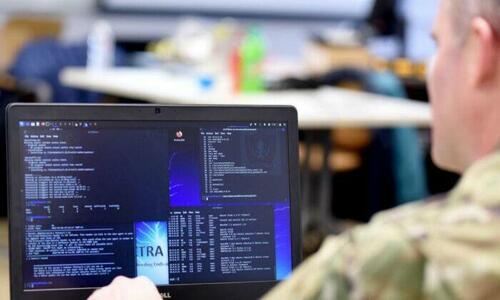by Mimi Nguyen Ly via The Epoch Times,
Cybersecurity units from the National Guard will be activated in 14 U.S. states to help counter any threats to election officials’ networks ahead of, during, and after the upcoming Nov. 8 midterm elections, according to reports.
The 14 include battleground states Arizona, Iowa, and Pennsylvania, as well as Colorado, Connecticut, Delaware, Hawaii, Illinois, Louisiana, North Carolina, New Mexico, New York, Washington, and West Virginia, reported Politico.
Brig. Gen. Gent Welsh, the commander of the Washington Air National Guard, said at a virtual media briefing on Nov. 4 that not every state is doing it but states that are activating these units “have invested in cyber talent and cyber missions for years,” according to outlet Statescoop, which reports on technology-related news in government.
“If you don’t have a cyber unit in your state you’re not in a good position to help them protect elections,” Welsh said.
He added that the National Guard’s participation in election cybersecurity activities “does add an air of credibility to what’s out there,” noting that the National Guard “is still one of the most trusted institutions in the United States.”
‘As Secure Elections as Possible’
The plan comes after eight states received support from cyber units in the National Guard during the primary elections that took place earlier this year.
According to the outlets, there are 38 dedicated cyber units within the Air and Army National Guard across the United States that work to help state and local officials on cyber-related issues such as network assessments and risk mitigation. The cyber units collectively comprise over 2,200 personnel.
“Our goal is to make sure we have as secure elections as possible. We are at the really beginning stages of this,” said Air Force Maj. Gen. Rich Neely, head of the Illinois National Guard, reported Statescoop.
National Guard officials will receive security updates from the Cybersecurity and Infrastructure Security Agency (CISA) in their work to support the midterms, Politico reported.
According to its website, CISA was created in 2018 under the Trump administration to work with government and industry partners to defend against current and predicted threats to cyber and physical infrastructure, including election infrastructure.
No Indication of Potential Election Infrastructure Disruption: CISA Director
CISA Director Jen Easterly has repeatedly said she doesn’t expect any major disruptions to the midterms. Most recently, on Nov. 1, at an event hosted by the Center for Strategic and International Studies, Easterly said that there is “no information credible or specific about efforts to disrupt or compromise” election infrastructure and that she was “very confident that we have done everything we can to make election infrastructure as secure and as resilient as possible.”
Air Force Maj. Gen. Rich Neely, head of the Illinois National Guard, said that he and his team are “not expecting to see anything.”
“But much like we did after Jan. 6, if the Guard’s called in, the Guard responds as needed,” he said, reported Statescoop.
“We’re not expecting anything with what we’re seeing.”
Army Major General M. Todd Hunt, the adjutant general of the North Carolina National Guard, said at the media briefing on Nov. 4 that his state has a joint cyber mission center that will facilitate communication between the state’s cyber unit, its departments of Information Technology and Emergency Management, as well as federal contacts from CISA, the Department of Homeland Security, and the FBI.
According to the outlets, Hunt said there will be 25 National Guard members on duty in the cyber unit for North Carolina on Election Day, up from the usual core team of 10. The extra members will include federal and emergency management partners.
“We will surge during the election to ensure that we have 24-hour coverage throughout this whole process,” Hunt said, per Politico. “We are citizen soldiers, we live in this state, and we do have a vested interest in our state elections as well as our federal elections.”

No comments:
Post a Comment
Note: Only a member of this blog may post a comment.